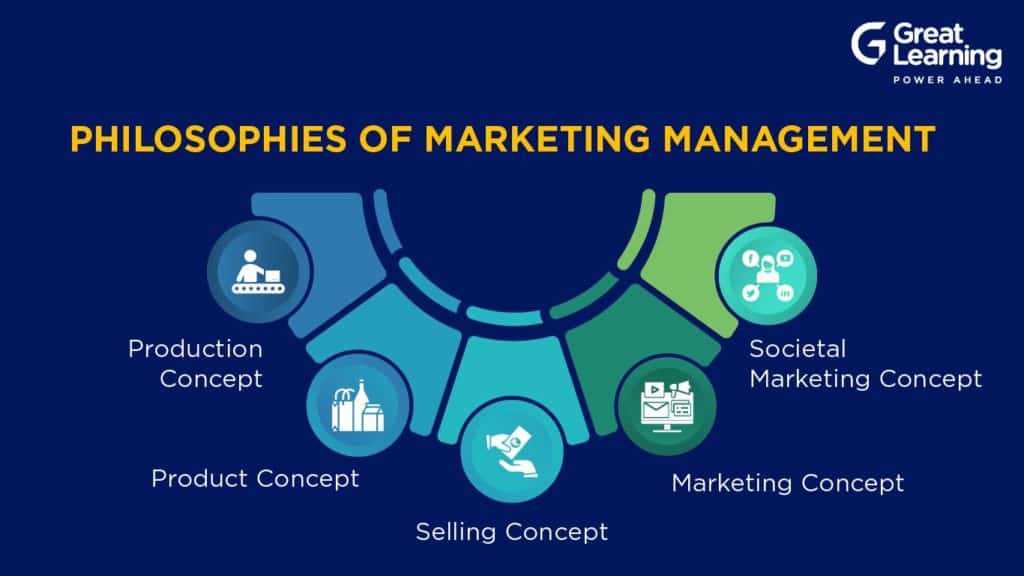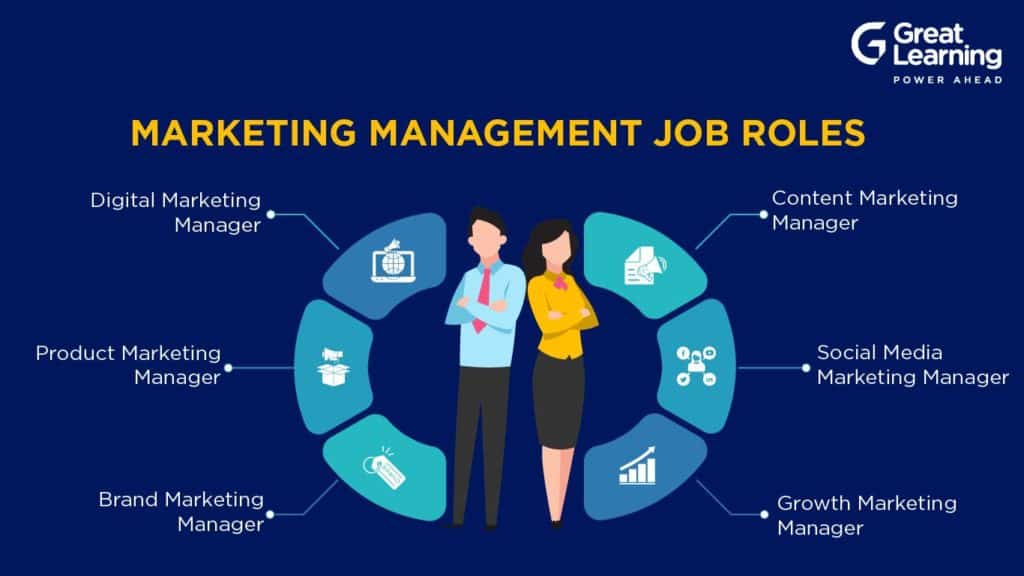Marketing Management is basically identifying market opportunities and implementing strategies to tell your consumer base about your products/services/business that can help you become profitable and build a brand.
There are a zillion definitions of Marketing Management which makes it complicated for many to understand the Concept in detail.
Well, we are here to make this easy for you. In this Marketing Management guide, you will cover the following:
What is Marketing Management?
We have already told you what is marketing management in simple words.
Coming to the formal definition, Marketing experts - Philip Kotler and Kevin Lane Keller define it as follows:
"Marketing Management is the art and science of choosing target markets and getting, keeping, and growing customers through creating, delivering, and communicating superior customer value."
Businesses use marketing management techniques to achieve broader business objectives. These include planning, strategizing, effectively connecting with customers to build a brand and capture as many potential customers as they can. Marketing Management professionals need to understand their customers, have extensive knowledge of the methods and strategies that will retain and satisfy them, and actively measure outcomes and optimize processes accordingly.
Consumer Insights and Marketing Strategy Course
Learn how to design impactful marketing strategies. Explore consumer behavior, market segmentation, and product management to effectively target the right audience.
Consider this analogy for better understanding: The manager of a Football Club does not manage the players and coach them. They need to understand the players, consider their strengths and weaknesses, create different methods and strategies to coach them, communicate, track their performance by data/metrics, and change processes basis outcomes/achievements.
The 4Ps of Marketing - product, place, price, and promotion play a significant role in devising an effective marketing strategy.
Importance of Marketing Management
A good marketing management strategy helps you build the brand and grow sales and gives you an edge over competitors. Here are a few reasons why marketing management is essential:
- Build and maintain the company's brand
- Boost sales(revenue)
- An opportunity/platform to launch new products
- Effective way of engaging customers
- Acts as a communication channel
- Provides actionable insights for the business
Processes Involved in Marketing Management
There is no standard process that an organization or one can follow when it comes to marketing management. But here are a few processes that most of the marketing management strategies have:
1. Conduct market research and analysis
The first step in the marketing management process is knowing your customers and competitors by conducting market research and analysis. This can be done by completing surveys, collecting data, assessing industry trends, and tracking previous campaigns. A SWOT analysis can also be conducted to understand the business/company. Basis all this, you can understand the customer's needs and pain points to offer a product or service that meets their demands.
2. Set mission statement and objectives
Although processes are important than outcomes, it is essential to know what are the expected results first. It is crucial to set objectives and goals as they give the foundation and set the right direction for your marketing journey. The marketing objectives can be set basis the factors that influence your target market, such as demand, pricing patterns, social and environmental factors, etc.
It is vital to include sales goals, budgets, and branding parameters as they help you monitor and measure the results later.
3. Develop marketing strategies
Once you have done the research and have set the objectives, it is vital to develop a robust marketing strategy.
Marketing strategy typical consists of:
Segmentation: Here, you are dividing the market to identify potential customers who are likely to buy your product/service.
Targeting: Here, you will further sub-divide the segments and focus on a particular target.
Positioning: This comes in mainly for brand building/positioning, where your brand's image is positioned in terms of quality and price.
Marketing mix – Here, focusing on 4Ps – product, price, place, and promotion to achieve broad business goals.
Budgeting/Financials - Here, you will focus on the overall budget allocation and financial management of your product/service.
4. Curate an actionable marketing plan
Once a marketing strategy is planned, the next step is to create an actionable marketing plan. Here you will focus on the period and develop a marketing calendar. This will be a go-to plan for anyone in the team to analyze and keep track of the progress.
5. Implement a marketing plan
Implementation is one of the essential marketing management processes. Putting your marketing plan into action and executing it to achieve business goals. The implementation is generally kick-started by spreading awareness to your customers about your product/service by sales, PR, social media, or advertising. You can allocate the resources and budgets as per the plan. One must follow the procedure to achieve planned outcomes.
6. Monitor, Measure, Modify and Evolve
The final stage is to monitor, analyze and track the progress. Here you will look at various parameters such as sales, revenue, customer feedback, brand positioning, no. of website visitors, the engagement rate on social media, and various other parameters basis the marketing plan and set objectives.
Work closely with sales and customer service teams for valuable insights, and gather data - such as customer profiles, interactions, and histories - from your existing software, including CCaaS platforms, AI contact centers, email marketing tools, and social media analytics.
It is crucial to monitor ourselves and our competitors and learn from them if they are performing well. This majorly helps in pricing and positioning your product/service. You can also use various CRM and analytics tools to smoothen this process and track it accurately.
Basis the progress and analyzed data, you can evolve your plan to reach higher milestones.
Philosophies of Marketing Management
There are various marketing management philosophies that help you achieve your business goals. These are also called marketing management concepts to help marketing professionals develop strategies and choose the right approach. Let us take a look at them below.

- Production Concept - focuses on the efficiency of your production and distribution(especially for product-based companies)
- Product Concept - focuses on the quality and performance of your products
- Selling Concept - focuses on sales and customer relationships
- Marketing Concept - a "customer-first" approach where you focus on getting the right customers for your product
- Societal Marketing Concept - focuses on the societal impact such as sustainable, socially, and environmentally responsible marketing that meets customers and business needs
Marketing Management Job Roles
There are various job roles available for Marketing Professionals. Here are a few of them:
- Digital Marketing Manager
- Product Marketing Manager
- Content Marketing Manager
- Brand Marketing Manager
- Social Media Marketing Manager
- Growth Marketing Manager

Digital Marketing Manager
Digital Marketing managers are responsible for planning, implementing, and managing digital marketing campaigns across all digital networks. Their roles and responsibilities include market research, planning campaigns, analyzing metrics, and identifying trends to increase brand awareness and positioning.
Explore Career Opportunities in Digital Marketing
Product Marketing Manager
Product marketing managers are responsible for developing robust marketing strategies and plans to communicate the vision, value, and features of new products to customers. They are the "voice of the product" at every organization and work closely with technical and sales teams.
Quick read: Product Management Career Path
Brand Marketing Manager
Brand marketing managers are mainly responsible for brand strategy and positioning. They focus on building the brand and ways to amplify the brand in the market. Their roles and responsibilities include analyzing competitors, market research, developing brand strategies, and budgeting, to name a few. They work closely with the graphic designing team.
Content Marketing Manager
Content marketing managers focus on creating compelling and engaging content that highlights the product/service of the organization. They focus not only on writing creative content but also on SEO. Their roles and responsibilities include planning and implementing effective content strategy, managing online and offline content, and SEO optimization.
Quick check: Basics of Content Marketing
Social Media Marketing Manager
Social media managers are typically responsible for direct interaction with the audience on social media platforms. They work mainly on creating social media content, optimizing social media handles, and generating potential leads as a long-term goal.
Quick check: An Introduction to Social Media Marketing
Growth Marketing Manager
Growth marketing managers focus on attracting, engaging, and retaining customers. They are responsible for building strategies and implementing them to scale the target audience or potential customers. Paid Advertising, Paid Search, CRO, E-mail marketing, and SEO are a few of their significant responsibilities.
Quick Check: Introduction to Search Engine Marketing
Frequently Asked Questions
1. What are the five marketing concepts or philosophies of marketing?
The five marketing concepts are as follows:
- Production Concept
- Product Concept
- Selling Concept
- Marketing Concept
- Societal Marketing Concept
2. What are the seven principles or 7Ps of marketing?
The 7Ps of marketing, commonly known as the extended marketing mix, include product, price, promotion, place, people, process, and physical evidence.
3. What are the tools or software used in marketing management?
There are various types of softwares used by marketers depending on the need and the size of the organization/project. Here are a few of the best marketing softwares that can help organizations/individuals master the modern marketing era:
- Marketo
- Hubspot
- Mailchimp
- SEMRush
- Ahrefs
- Google Search Console
- Google Ads
- Google Trends
- CMS softwares like WordPress, Wix, Webflow
- CRM softwares like Zoho, Salesforce
- Analytics tools like Google Analytics, Adobe Analytics, HotJar
- Creative softwares like Canva, Adobe Creative Cloud
- Vocus
- Hootsuite
- Yesware
- LocalVox
4. What courses can I take up to learn Marketing Management?
There are various programs/courses you can take up to learn marketing management. Here are a few:
- Introduction to Digital Marketing
- Digital Marketing Framework
- PG Program in Strategic Digital Marketing
- Advanced Certificate in Strategic Digital Marketing
- Customer-Centric Marketing Strategy
- Marketing Research Free Course
If you are interested in kickstarting your career in the Management domain, check out Post Graduate Diploma in Management and upskill today!






